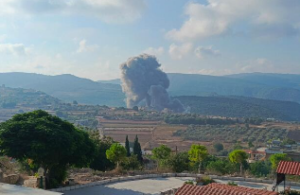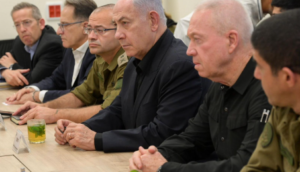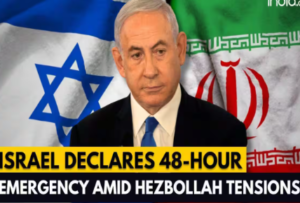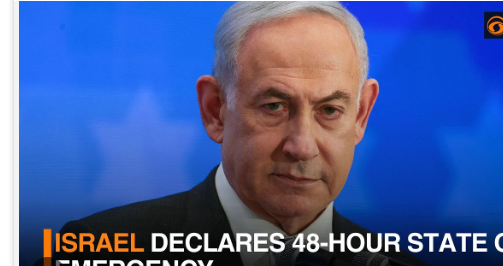JERUSALEM — August 26, 2024 — Israel’s Defence Minister Yoav Gallant announced a 48-hour nationwide state of emergency early Sunday following a significant escalation in hostilities with Hezbollah. The emergency declaration comes in response to a series of intense military exchanges between the Israeli Defense Forces (IDF) and Hezbollah, the Lebanese militant group.
Israel Launches Preemptive Strikes in Lebanon
The Israeli military launched a series of preemptive airstrikes in southern Lebanon, deploying around 100 jets to target over 40 Hezbollah rocket launch sites. According to Israeli officials, these strikes were intended to thwart a much larger attack that Hezbollah was allegedly preparing. The IDF reported that thousands of launcher barrels, primarily aimed at northern Israel, were destroyed in the operation.

Hezbollah Retaliates with Rocket and Drone Attacks
In retaliation, Hezbollah launched hundreds of rockets and drones towards Israel. The group claimed responsibility for firing 320 Katyusha rockets, hitting 11 military targets across Israel. One of the most notable targets was a military intelligence base near Tel Aviv, identified by Hezbollah’s leader, Hassan Nasrallah, as the main target of the assault. However, Israeli military sources denied any successful strikes on this location.
Casualties and Damage
The intense exchanges resulted in three confirmed deaths in Lebanon. In Israel, damage appeared to be limited, though one navy soldier was killed, and two others were injured during combat in northern Israel. The soldier’s death reportedly occurred on a naval vessel as Israel’s Iron Dome aerial defense system intercepted a drone launched by Hezbollah.
International Reactions and Warnings
The conflict has drawn significant international attention, with world leaders expressing concern over the potential for a broader conflict. Egyptian President Abdel Fattah al-Sisi warned of the dangers of opening a new front in Lebanon, urging the international community to intensify efforts to de-escalate the situation.
The United States, closely monitoring the developments, reiterated its support for Israel’s right to defend itself while calling for regional stability. President Joe Biden, through the White House, emphasized the importance of diplomatic efforts to prevent further escalation.
UN Calls for Restraint
The United Nations has also called for an immediate ceasefire, with the UN peacekeeping force in Lebanon and the UN’s special coordinator’s office expressing deep concern over the ongoing violence. The situation remains fluid, with both sides assessing the impact of the latest military actions and considering their next moves.
As the 48-hour emergency unfolds, the world watches closely, hoping that cooler heads will prevail and prevent the situation from spiraling into a full-scale war.
Hezbollah, a Shiite militant group based in Lebanon, has long been a significant adversary of Israel. The group, which emerged in the 1980s, has grown into a powerful political and military force in Lebanon, backed by Iran. The relationship between Hezbollah and Israel is marked by a history of hostility, with several conflicts, the most notable being the 2006 Lebanon War. The current tensions are part of this longstanding animosity, exacerbated by recent events.
The Trigger: Assassination of Fuad Shukr
The recent escalation can be traced back to the assassination of Fuad Shukr, a senior Hezbollah commander, last month. Israel has not officially claimed responsibility, but Hezbollah holds Israel accountable. Shukr was a key figure within Hezbollah, involved in various military operations against Israel. His death has fueled the group’s desire for retaliation, leading to the current situation.
Details of the Military Operations
- Israel’s Airstrikes: The IDF’s preemptive airstrikes in Lebanon were significant in scale. Using 100 jets to hit over 40 launch sites indicates a large-scale operation aimed at neutralizing Hezbollah’s capabilities. The targets were primarily in southern Lebanon, a region where Hezbollah has a strong presence and from where it often launches attacks against Israel.
- Hezbollah’s Response: Hezbollah’s retaliatory attacks were widespread, with 320 Katyusha rockets fired and multiple drones launched towards Israel. The use of drones signifies an escalation in the technological capabilities of Hezbollah, which has been gradually improving its arsenal with support from Iran.

- Casualties and Damage Assessment
- Lebanon: The Lebanese authorities confirmed three deaths, but the overall impact on the ground is still being assessed. The airstrikes have likely caused significant damage to infrastructure in the affected areas.
- Israel: While the Iron Dome defense system successfully intercepted many of the incoming rockets and drones, the death of an Israeli navy soldier underscores the conflict’s toll. The soldier’s death is particularly significant as it occurred during an interception operation, highlighting the risks involved in defending against such attacks.
International and Regional Reactions
- Egypt’s Role: Egypt, under President Abdel Fattah al-Sisi, has been a key mediator in the region, often involved in ceasefire negotiations between Israel and various Palestinian factions. Sisi’s warning about the risks of a new front in Lebanon reflects the broader concern in the Arab world about the potential for wider regional instability.
- United States: The U.S. has reiterated its support for Israel while also emphasizing the importance of regional stability. The Biden administration is likely engaging in diplomatic efforts behind the scenes to de-escalate the situation, as a broader conflict could have significant geopolitical implications, including affecting U.S. interests in the region.
- United Nations: The UN’s call for restraint is part of its ongoing efforts to prevent conflicts in the region from spiraling out of control. The UN peacekeeping force in Lebanon (UNIFIL) has been a key player in maintaining a fragile peace in the area, and its role could become even more critical if the situation worsens.
- Potential Implications
- Regional Stability: The conflict has the potential to destabilize the entire region, particularly if it escalates further. A full-scale war between Israel and Hezbollah could draw in other regional players, including Iran, which is a major backer of Hezbollah.
- Humanitarian Impact: An escalation could lead to a significant humanitarian crisis, particularly in Lebanon, which is already grappling with economic difficulties and political instability. The international community may need to prepare for potential refugee flows and increased humanitarian aid needs.
- Global Economic Impact: The conflict could also impact global markets, particularly oil prices, if the situation escalates and threatens the stability of the wider Middle East.
- This situation is dynamic, with the potential for rapid changes depending on the actions of both Israel and Hezbollah, as well as international diplomatic efforts






